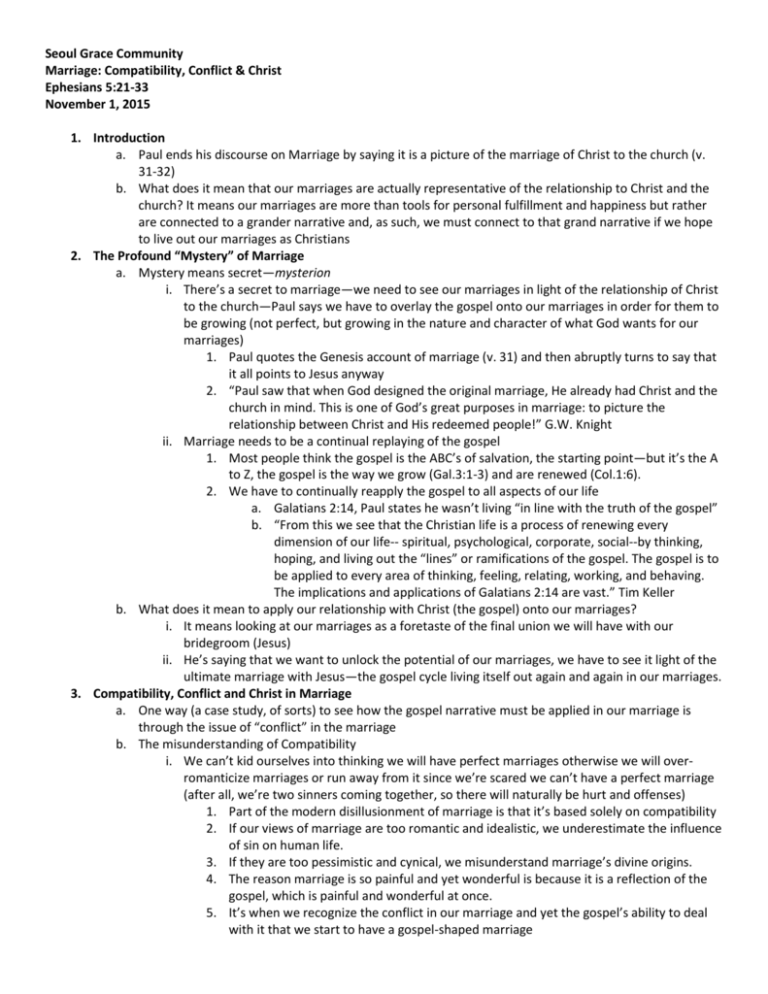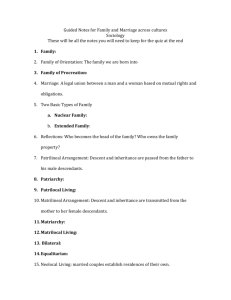Seoul Grace Community Marriage: Compatibility, Conflict & Christ
advertisement

Seoul Grace Community Marriage: Compatibility, Conflict & Christ Ephesians 5:21-33 November 1, 2015 1. Introduction a. Paul ends his discourse on Marriage by saying it is a picture of the marriage of Christ to the church (v. 31-32) b. What does it mean that our marriages are actually representative of the relationship to Christ and the church? It means our marriages are more than tools for personal fulfillment and happiness but rather are connected to a grander narrative and, as such, we must connect to that grand narrative if we hope to live out our marriages as Christians 2. The Profound “Mystery” of Marriage a. Mystery means secret—mysterion i. There’s a secret to marriage—we need to see our marriages in light of the relationship of Christ to the church—Paul says we have to overlay the gospel onto our marriages in order for them to be growing (not perfect, but growing in the nature and character of what God wants for our marriages) 1. Paul quotes the Genesis account of marriage (v. 31) and then abruptly turns to say that it all points to Jesus anyway 2. “Paul saw that when God designed the original marriage, He already had Christ and the church in mind. This is one of God’s great purposes in marriage: to picture the relationship between Christ and His redeemed people!” G.W. Knight ii. Marriage needs to be a continual replaying of the gospel 1. Most people think the gospel is the ABC’s of salvation, the starting point—but it’s the A to Z, the gospel is the way we grow (Gal.3:1-3) and are renewed (Col.1:6). 2. We have to continually reapply the gospel to all aspects of our life a. Galatians 2:14, Paul states he wasn’t living “in line with the truth of the gospel” b. “From this we see that the Christian life is a process of renewing every dimension of our life-- spiritual, psychological, corporate, social--by thinking, hoping, and living out the “lines” or ramifications of the gospel. The gospel is to be applied to every area of thinking, feeling, relating, working, and behaving. The implications and applications of Galatians 2:14 are vast.” Tim Keller b. What does it mean to apply our relationship with Christ (the gospel) onto our marriages? i. It means looking at our marriages as a foretaste of the final union we will have with our bridegroom (Jesus) ii. He’s saying that we want to unlock the potential of our marriages, we have to see it light of the ultimate marriage with Jesus—the gospel cycle living itself out again and again in our marriages. 3. Compatibility, Conflict and Christ in Marriage a. One way (a case study, of sorts) to see how the gospel narrative must be applied in our marriage is through the issue of “conflict” in the marriage b. The misunderstanding of Compatibility i. We can’t kid ourselves into thinking we will have perfect marriages otherwise we will overromanticize marriages or run away from it since we’re scared we can’t have a perfect marriage (after all, we’re two sinners coming together, so there will naturally be hurt and offenses) 1. Part of the modern disillusionment of marriage is that it’s based solely on compatibility 2. If our views of marriage are too romantic and idealistic, we underestimate the influence of sin on human life. 3. If they are too pessimistic and cynical, we misunderstand marriage’s divine origins. 4. The reason marriage is so painful and yet wonderful is because it is a reflection of the gospel, which is painful and wonderful at once. 5. It’s when we recognize the conflict in our marriage and yet the gospel’s ability to deal with it that we start to have a gospel-shaped marriage c. Conflict and Christ i. Let’s apply this “gospel cycle” to a specific aspect of marriage: conflict ii. Marriage teaches you about repentance and forgiveness (namely grace in the midst of hurt) 1. Our marriage relationship can't be about our works (two sinners brought together). 2. There must be a level of forgiveness unlike anywhere else. iii. In marriage there is the drama of salvation being played out over and over again. 1. You have peace until someone decides to seek their own glory (Adam and Eve in the garden). 2. Then there's alienation and hostility (The Fall). 3. Then someone reaches out and there's reconciliation and healing (Jesus). 4. This is the gospel cycle. 5. And this is what God does. He chooses us. And we need to repent. Both of these have to happen in our spiritual and marital life. iv. True repentance 1. The offender truly repents. Not: I’m sorry, but… 2. Prodigal son. He returns with no excuses and no demands. Not penitence. Or explanation. v. True forgiveness 1. When we are offended we must set aside our desire for vengeance. It's a shadow of what God did for us. 2. But the way we know we are a forgiven sinner is that we can forgive. To the extent we can forgive our spouse is because we know how much we’ve been forgiven. 3. In marriage you will always hunt for power and glory unless you know you've been given it freely already through Jesus Christ laying down His life for you. 4. We can't forgive the other if we don't understand our own need for forgiveness. 5. This type of forgiveness and repentance in the intimate bonds of marriage is only possible if we reflect on the new intimacy we have in marriage now with God after we become a Christian. This is why our relationship to Jesus is equated to marriage.







